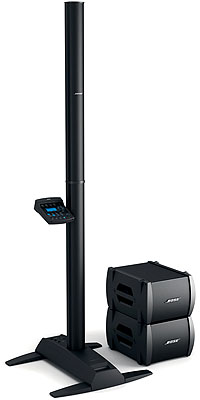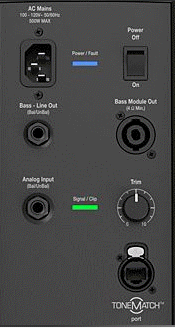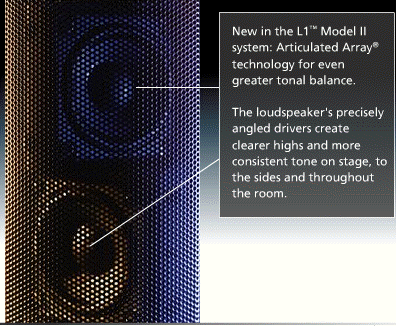L1® Model II
Contents |
Introduced March 29, 2007
|
FAQs
NOTE: these will be moved to a new page when there are more of them.
Start Up / Cycle Time
The model II takes a few seconds to fully boot up and then turn the audio on. Make sure you are waiting the right amount of time.
Secondly, if you do reset the system for some reason, be sure to wait a full two or three seconds between turning it off and turning it back on.
- MikeZ-at-Bose[1]
Fan Noise
Q: The fan in the Power Stand comes on when I strike a chord on my Guitar. Is this normal? A: Your unit is functioning properly - no problem.
The fan in the PS2 comes on when the input signal level goes over a certain limit, regardless of what the internal temperature of the unit is. That way, the unit never gets too hot to where a fan needs to be on constantly.
Whatever you do, please don't cover up the fan port.[2]
Input Panel
- Analog input, trim control and signal/clip LED
- Line-level analog input accepts 1/4" TRS phone cable. Can be used for instruments or other audio sources like DJ mixers, MP3 players, computers or DVD systems. Trim control lets you adjust the level of analog input signal. Signal/clip LED indicates status of analog input signal.
- Bass module out
- Delivers amplified bass output signal to one or two B1 bass modules. L1 system automatically adjusts equalization appropriately when bass modules are connected.
- ToneMatch™ port
- Digital audio and power connection for ToneMatch audio engine. Use with included ToneMatch cable.
- Bass line out
- Post-DSP bass signal output. Accepts 1/4" TRS phone cable. Use to connect PackLite® amplifier with up to two additional bass modules. Can also be used to connect powered subwoofer or additional amplification system.
No Speakers Attached
If you want to record using USB without using the Template:L1CR or B1 Bass Module ...
You can certainly run the L1 with all, some, or none of the speakers connected. With no speakers connected it will happily serve as a big power supply for the T1. You are in no way risking damage to the unit by doing this.[3]
Articulated Array®
Identifying this Model
- Retractable legs
- Provide stability for streamlined L1 Model II power stand and loudspeaker. Four retractable legs fold out of power stand simultaneously for quick setup and compact transport. Small footprint also frees up room on tight stages.
- Light weight (23.7 lbs (10.7 kg)
Compatibility
Compatible with
- L1 Model II Cylindrical Radiator® loudspeaker
- T1 ToneMatch™ audio engine
- B1 Bass Module
- PackLite® power amplifier model A1
Related Documents
Mechanical Specifications
L1 Model II
- L1 Model II Cylindrical Radiator® loudspeaker top:
- 43 1/2H x 3 1/2W x 4D (1.1 m x 9.0 cm x 10.5 cm)
- 16.3 lbs (7.4 kg)
- L1 Model II Cylindrical Radiator® loudspeaker bottom:
- 43 1/2H x 3 1/2W x 4D (1.1 m x 9.0 cm x 10.5 cm)
- 17.4 lbs (7.9 kg)
- L1™ Model II power stand:
- 5H x 10W x 27D (12.8 cm x 26.2 cm x 69.2 cm)
- 23.7 lbs (10.7 kg)
B1 Bass module
- 15H x 10 1/4W x 17 3/4D (38.0 cm x 26.0 cm x 45.0 cm)
- 25.1 lbs (11.4 kg)
T1 ToneMatch™ audio engine
- 2 2/3H x 6 1/2W x 8 1/4D (6.76 cm x 16.6 cm x 20.9 cm)
- 2.1 lbs (1.0 kg)
Electrical
- AC power rating:
- 100-120V 50/60Hz 500W (USA/Canada)
- Power stand inputs/outputs
- ToneMatch port for T1 ToneMatch audio engine
- 1/4" analog input
- 1/4" bass line output
- Neutrik NL4 bass module out
What's in the Box
- L1 Model II Cylindrical Radiator® loudspeaker box ===
- Loudspeaker top and bottom
- Carrying bags
- Power stand box
- Power stand
- Power cord
- Protective plug
- Carrying bag
- ↑ MikeZ-at-Bose talks about Start Up and Cycle times with the L1™ Model II
- ↑ MikeZ-at-Bose Model II Fan Noise
- ↑ MikeZ-at-Bose talks about Using the L1™ Model II Power Stand without any speakers attached



